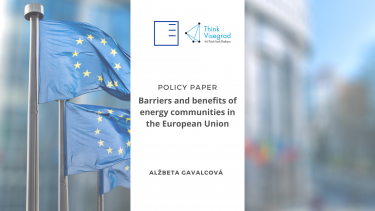Policy Paper | Barriers and benefits of energy communities in the European Union
Energy communities are an effective means to decentralize and renew our energy systems with sustainable solutions as they are usually based on renewable energy. They have already started emerging in 1970´s, yet there has been a significant increase in their development only in recent years, also in terms of their introduction into the EU legislation. Especially in Western and Northern European countries the concept already enjoys vast popularity. On the other hand, in Central and Eastern European countries (further referred to as CEE) energy communities are only beginning to emerge. The policy brief (based on literature and interviews with various stakeholders ) examines the benefits energy communities may bring, and more importantly, the main obstacles remaining in their way for greater evolution in the CEE region – and especially Visegrad countries (V4). As these initiatives progress, sharing the best practices will ensure the success of the community energy in the energy transition. Writes Alžbeta Gavalcová.
Zjistit vícePolicy Paper | Barriers and benefits of energy communities in the European Union
Energetické komunity jsou účinným prostředkem decentralizace a obnovy našich energetických systémů pomocí udržitelných řešení, protože jsou obvykle založeny na obnovitelné energii. Začaly se objevovat již v 70. letech 20. století, avšak k jejich výraznému rozvoji došlo až v posledních letech, a to i z hlediska jejich zavedení do legislativy EU. Zejména v zemích západní a severní Evropy se tato koncepce již těší velké oblibě. Naproti tomu v zemích střední a východní Evropy (dále jen SVE) se energetická společenství teprve začínají vytvářet. Tento politický brief (založený na literatuře a rozhovorech s různými zúčastněnými stranami ) zkoumá výhody, které mohou energetická společenství přinést, a především hlavní překážky, které jim stále stojí v cestě k většímu rozvoji v regionu střední a východní Evropy - a zejména v zemích Visegrádské skupiny (V4). Jak tyto iniciativy postupují, sdílení osvědčených postupů zajistí úspěch komunitní energetiky v energetickém přechodu. Píše Alžbeta Gavalcová.
Zjistit víceČRo Plus | The EU lags behind the US and China due to weak capital strength and new technologies
The European Union economically lags behind the United States of America and China. The recent meeting in Brussels reflected concerns about a slowdown in the EU economy, which entered 2024 with lower-than-expected growth. EUROPEUM Institute analyst Vít Havelka commented on this situation for ČRo Plus.
Zjistit více
RTVS | Extraordinary Summit in Brussels
The extraordinary summit in Brussels is focusing on competitiveness and the EU's strategic agenda, including the strengthening of the single market, Turkey-EU relations, Ukraine and Israel. Žiga Faktor, head of the Brussels office and deputy director of EUROPEUM Institute, commented on this for Slovak RTVS.
Zjistit více
iRozhlas.cz | Fossil fuel boilers are not banned by the European Union
The information about an EU-wide ban on gas and coal boilers, that has been recently circulating on social media, is not true. The aim of the new European directive is not to ban them, but to promote the phasing out of these boilers in line with the 2050 carbon neutrality targets. Viktor Daněk, deputy director of the EUROPEUM Institute, described the nature of the directive to the iROZHLAS.cz project Ověřovna.
Zjistit víceTN.cz | Macron's visit to Prague: Nuclear energy and European security on the agenda
French President Emmanuel Macron visited Prague on Tuesday, met with Czech President Petr Pavel and Prime Minister Petr Fiala, and briefly visited the Czech-French Nuclear Forum. Martin Vokálek, Executive Director of the EUROPEUM Institute, discussed the programme of the state visit and its impact on the Czech Republic in an interview for TN.cz.
Zjistit více
INVITATION | Europe in the grip of crises - What next?
We cordially invite you to a debate with Andrej Stančík on the topic "Europe in the grip of crises - What next?", which will take place on Monday 13th February at 18:00. The debate will take place in the premises of PKC (Prague Creative Centre)
Zjistit víceČRo Plus: European Union increases commitment to renewable energy growth
The European Union is planning to increase its commitment to growing the share of renewables in the energy mix. Together, the Union now wants to reach 42.5 percent of renewable energy. How are individual member states approaching the challenge? EUROPEUM Senior Research Fellow Kateřina Davidová analysed this topic for Czech Radio.
Zjistit více
Trend.sk: The Union is not giving up on the idea of a green future. Although it will increase prices for housing and travel
Kateřina Davidová, who leads our climate research team, explains to TREND the possible risks of the new European standards. In the interview, she also adds the reasons why the EU insists on its green policy.
Zjistit více
Staroměstské náměstí 4/1
Praha 1 - Staré Město
110 00
tel.: +420 212 246 552
email: europeum@europeum.org
https://www.europeum.org








